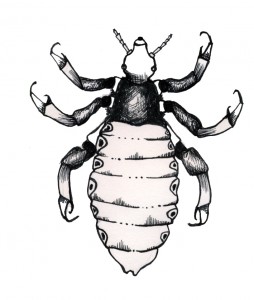The Student Health Center is telling students not to come in to get checked for lice after a warning from University Housing and Food Services prompted about 50 students to get their heads checked. Although staff at the center encourage students to come in with health problems, they are currently busy with an influx of halloween-related visits, said Jill Cannaday, the nursing supervisor for the Student Health Center.
“It’s kind of a perfect storm for us,” Cannaday said. “A couple of people were out sick and we were really slammed after Halloween.”
Many students from Lassen Hall began getting their heads checked Friday after an email notified students that several cases of lice had been reported in the dorms. Concerned students asked Student Health Center staff whether lice could live in the showers — they can’t — and one put up a poster in the dorm telling students to get themselves checked, Cannaday said. Many students just had dry scalps, which were itchy.
“It sort of ran through the rumor mill,” she said.
Although the Student Health Center has only confirmed four to seven cases of lice, David Stephen, the director of University Housing and Food Service, said there are a total of about 30 cases of lice diagnosed.
The first cases of lice in Lassen Hall were confirmed early last week, Stephen said. In response, university housing administrators advised students that they could get their heads checked at the Student Health Center.
University housing officials are not unsure what caused the sudden spread of lice, Stephen said.
Head lice do not spread disease and cannot jump from head to head, according to a notice sent to residents. Lice only feed on human blood and can’t live any longer than 48 hours without feeding.
Tim King, a freshman agricultural business major who lives in Lassen Hall has heard people discussing the email around campus.
“The whole thing is just gross,” King said. “I’m just trying to keep my hair away from everyone else’s heads.”
To get rid of head lice, students were advised to use over-the-counter medications like NIX or RID, according to the notice. Students were also advised not to share hair brushes, hats, headphones or anything that could come into contact with hair. They were also told not to shave their heads.
Although the Student Health Center sells lotion that kills lice, the staff at the center can’t do anything to treat the problem.
“All we can do is confirm you have it,” Cannaday said.
Aubrey Crosby contributed to this report.
The Orion can be reached at [email protected] or @theorion_news on Twitter.
Illustration by Liz Coffee.








